-
No-Code
Platform
-
Studio
No-code agentic platform delivering the fastest time-to-value and the highest ROI
-
Studio
-
AI-Native CRM
CRM
-
AI-Native CRM
New era CRM to manage customer & operational workflows
CRM Products -
AI-Native CRM
- Industries
- Customers
- Partners
- About
AI Agents for Customer Service - How AI Supports Humans to Deliver Excellent Customer Service at Scale
Updated on
February 24, 2026
17 min read
Deliver 24/7 support with Creatio’s AI agents

Rising customer expectations and increasing service volumes are pushing traditional customer service models beyond their limits, making it difficult to deliver fast, personalized support at scale. AI agents are redefining this model by executing routine service tasks, providing data-driven insights, guiding next-best actions, and streamlining workflows, reducing the customer service representative's workload. According to Creatio’s 2025 Global Survey Report, The State of AI Agents & No-Code, AI agents are increasingly deployed in frontline growth functions, with nearly one in five AI agents worldwide already deployed in customer service functions.
Key Takeaways:
- AI customer service agents are intelligent systems that use machine learning and natural language processing to understand intent, answer queries, execute tasks, and assist service teams.
- By handling routine questions, accelerating case resolution, and supporting self-service problem-solving, customer service agents reduce the workload on human representatives and improve customer satisfaction.
- Customer service agents powered by AI can interact with customers across channels, route complex issues to the right team members, surface insights, update knowledge bases, and analyze sentiment and performance to strengthen service quality.
- Top vendors offering AI customer service agents include Creatio, Zendesk, Intercom, Salesforce, Freshworks, HubSpot, and Sendbird.
What are AI Agents for Customer Service?
AI agents in customer service are designed to autonomously execute tasks to increase teams' productivity and elevate customer satisfaction. AI agents can interact with customers to provide instant assistance, answering customers' questions, resolving issues, and helping with tasks that, until recently, required human agents' attention.
AI agents leverage advanced technologies, such as Machine Learning (ML) and Natural Language Processing (NLP), to offer more seamless and relevant customer experiences than traditional chatbots. Powered by this technology, an AI agent can go beyond simple keyword matching to genuinely understand customers' intentions, even if the phrasing is complex or indirect. An AI agent can also learn from past interactions and improve its responses over time to provide more accurate support.

Agentic AI has emerged as a game-changer for customer service, paving the way for autonomous and low-effort customer experiences. Unlike traditional GenAI tools that assist users with information, agentic AI will proactively resolve service requests on behalf of customers, marking a new era in customer engagement.
Agentic AI in Customer Service: From Chatbots to Autonomous Service Execution
The introduction of customer service agents began with chatbots - rule-based systems designed to answer FAQs, retrieve basic information, and handle straightforward cases. Over time, AI tools became more conversational and context-aware, helping customer service representatives surface relevant customer information and guide case resolution. Yet they remained assistive in nature, responding to human prompts and operating reactively rather than proactively. As customer expectations for fast and effective service continued to rise, these capabilities evolved into agentic AI - autonomous service execution systems that fundamentally reshape how customer service is delivered.
Agentic AI is used in the form of autonomous agents that can plan, make decisions, and execute multi-step service workflows. Unlike AI customer service agents, which primarily support customer service representatives in completing tasks, agentic AI systems can autonomously resolve service cases, coordinate tasks across systems, and adapt to real-time context and outcomes. This is especially useful in high-volume, enterprise, and omnichannel service environments, where complex workflows, multilingual support, and rising case volumes demand more advanced tools. As a result, organizations can move beyond reactive support models toward intelligent service operations that deliver faster resolutions and more consistent customer experiences.
The State of AI Agents & No-Code
Learn how 560+ leaders across the world use AI and no-code to drive innovation today
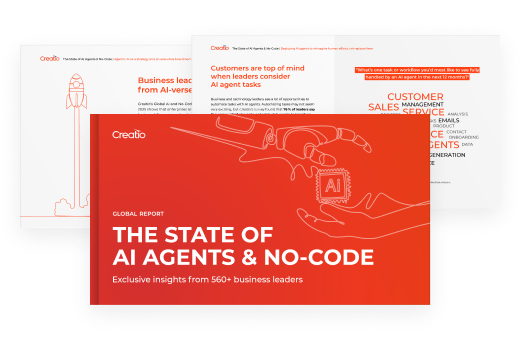
How AI Agents Empower Customer Service?
AI customer service agents not only support clients by answering typical questions, but can also assist human agents, helping them resolve cases faster and more effectively.
Here are some of the most common use cases of AI agents in customer service:
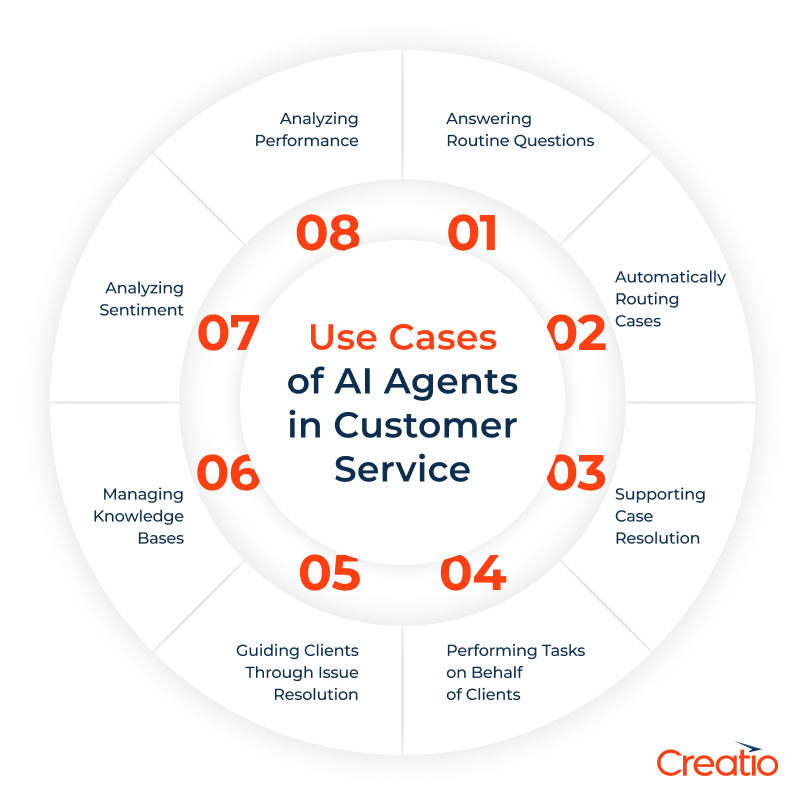
Answering routine questions
AI agents can power chatbots and virtual assistants to answer typical customer queries in natural language and reduce ticket volumes. They can analyze customer data in real time and personalize interactions based on past interactions, previous customer purchases, preferences, needs, and behaviors. Available 24/7, AI agents provide instant support in multiple languages, helping customers even outside of business hours, and allowing human agents to focus on more complex queries.
Automatically routing cases
Complex cases often require emotional intelligence and advanced problem-solving skills, which AI agents don't yet possess. When an AI agent analyzes a customer inquiry and understands that it won't be able to provide an efficient solution, it can automatically route it to a human agent. AI chooses a customer representative best equipped to handle the task based on experience, expertise, and workload. To ensure the handoff is smooth and customers don't have to repeat themselves, the AI agent prepares a case summary and customer history and instantly shares it with the human agent.
Supporting case resolution
Customer support representative can leverage AI agents to enhance the effectiveness of case resolution. AI agents can instantly surface important information from a company's knowledge base and customer records or analyze past case outcomes to suggest the best way to handle a case. Thanks to these actionable insights, customer support agents are better equipped to provide fast and relevant support. AI agents powered by generative AI technology can also help draft personalized responses, speed up case resolution, and increase overall customer satisfaction.
Performing tasks on behalf of clients
AI agents are more than simple chatbots. While they often answer customer questions, they can also assist with various tasks. For example, an AI agent can check order statuses, cancel monthly subscriptions, fill in return forms, and file complaints on behalf of clients. This is possible thanks to the AI agents' ability to perform actions autonomously, without the need for constant human input.
Gartner predicts that by 2029, AI agents will autonomously resolve 80% of common customer service issues, eliminating the need for human intervention in most routine cases.
Guiding clients through issue resolution
AI agents can guide clients through issue resolution, providing step-by-step instructions on how to tackle a problem. This functionality is handy in tech industries, where clients often experience similar technical problems. AI agents can analyze the issue a client reports, understand it, guide clients through basic troubleshooting, and retrieve information necessary to resolve a specific situation from the knowledge base. They can also interpret a client's responses, identify whether a suggested solution worked, and if not, recommend a different approach. When the standard solutions are exhausted, the agent can hand off the case to a customer support representative for further support.
Managing knowledge bases
AI agents streamline the management of knowledge bases by automatically updating companies' internal resources. They can analyze what led to a successful case resolution, summarize the solution, and store it in the internal knowledge base to speed up the resolution of similar cases in the future. Furthermore, generative AI agents can create knowledge articles based on these resolved cases, ensuring valuable insights are readily available to agents and customers.
Analyzing sentiment
AI agents can assist businesses in analyzing customer sentiment by using natural language processing to gather feedback from internal tools and external sources, such as social media, Google reviews, etc. These insights are crucial for businesses as they help them understand how customers really feel about their brand and implement proactive measures to strengthen a positive brand image and better answer customer needs.
Analyzing performance
AI agents can analyze customer service teams' performance and effectiveness of customer support efforts by continuously monitoring metrics such as average handling time, resolution rates, customer satisfaction scores, etc. Using this data, AI customer service agents can prepare performance reports for stakeholders, identify bottlenecks, and recommend actions to improve overall support effectiveness.
It's important to note that AI agents are not designed to replace humans, despite what some headlines may suggest. The purpose is to support service teams by handling routine questions and automating repetitive tasks, allowing humans to focus on more complex, high-value interactions.

We see the real opportunity not in agents replacing humans, but in agents complementing teams – human and digital working together in hybrid organizations.
Benefits of Using AI Customer Service Agents
AI agents offer multiple benefits, from improving customer experiences and increasing human agents' productivity to reducing operational costs. In this section, we'll explore the key benefits of AI agents and how they contribute to improved service delivery and business performance.
Here's a list of the top benefits brought by customer service AI agents:
- Improved customer satisfaction - faster response times, 24/7 availability, and accurate information directly contribute to a more positive customer experience. Customers' satisfaction levels increase when they can quickly and easily resolve their issues.
- Stronger customer loyalty - AI agents can deliver highly personalized experiences by tailoring interactions to each client. This goes beyond simply addressing a customer by their name. AI agents analyze customer data, past interactions, their preferences, and behavior to provide relevant and accurate information. This hyper-personalization improves customer experiences and strengthens client loyalty.
- Higher First Contact Resolution (FCR) rates - AI agents significantly boost the first-contact resolution rates by understanding customer intent, accessing relevant information, and executing actions in real time. This allows more queries to be fully resolved without the need for follow-ups or escalations to human agents.
- Improved productivity - AI agents can significantly increase human agents' productivity by handling repetitive queries, automating customer service-related tasks, and surfacing actionable insights. According to Nielsen Norman Group research, support agents who used an AI tool could handle 13.8% more customer inquiries per hour.
- Efficient scalability - AI agents can easily handle an increased number of cases during peak season, promotional events, or unexpected surges in customer inquiries without compromising on quality.
- Cost reduction - with AI customer service agents, companies can avoid increasing customer support costs related to hiring additional staff or opening entire customer service offices to support new regions. According to Gartner, by 2029, tasking AI agents with resolving common customer service issues will result in a 30% reduction in operational costs.
Supporting Employees with AI-Powered Chatbots
Discover how the Bank of Georgia empowers its internal teams with AI-powered chatbots to boost operational efficiency

Best AI Agents for Customer Service in 2026
The market for AI agents in customer service is growing rapidly, with new capabilities emerging seemingly daily. As technology evolves, businesses continually discover innovative ways to leverage AI for improved customer interactions. Finding the best solution for your business might be challenging in this crowded market. That's why we prepared a list of the best AI agents for customer service in 2026 to help you make an informed decision.
1. Creatio
Creatio is a leading provider of customer service AI agents, which are natively available in Creatio Service, an agentic CRM and service management platform. Creatio seamlessly embeds AI into its core, empowering organizations with intelligent, end-to-end automation. With pre-built role-based AI agents designed for customer service, Creatio enables organizations to increase first-contact resolution rates, reduce handling time, improve service quality, and maintain high customer satisfaction.

Creatio's AI customer service agents
Creatio's AI agents understand, act, and learn in a business environment. They can execute multi-step tasks and support informed decision-making, increasing employees' productivity and operational efficiency. By taking actions, recommending next steps in real time, and delivering contextual insights, AI customer service agents directly support users in their daily tasks and enhance the performance of customer service teams.
Creatio’s AI agents for customer service include:
- Case understanding creates summaries of case descriptions and email threads to provide context in seconds without manual work.
- Resolution guidance supports service teams in delivering faster, more accurate resolutions by providing actionable insights, creating step-by-step resolution plans based on customer history and previously resolved tickets, and guiding users through the agent operating procedures.
- Next-best-action suggests the most effective steps to solve the issue based on case details and historical successful resolutions.
- Knowledge creation drafts structured Knowledge Base articles based on the details and resolution steps of successfully closed cases.
- Service performance insights builds charts and dashboards with details about case volume, resolution times, first contact resolutions, and agent performance.
- Agent productivity rewrites responses to be more empathetic or professional, translates messages instantly to enable seamless support for global customers, and schedules meetings and follow-ups.
Creatio continuously adds new pre-built agents to its offering to address the growing needs of modern businesses. Users can also build and deploy hyper-personalized AI agents tailored to their unique requirements by themselves using Creatio’s no-code platform, an agent builder, and integrated AI capabilities.
Creatio empowers organizations to use AI agents while maintaining full control, transparency, and security. With safe AI architecture, a human-in-the-loop approach, role-based access controls, and a robust governance framework, businesses can ensure they adhere to data privacy standards and industry regulations. Creatio allows businesses to decide how much autonomy their agents have and provides tools for human agents to monitor AI responses and actions in real-time, ensuring alignment with company policies and goals.
Pricing:
Creatio's AI agents are an integral part of the platform and are accessible to all users across all functions at no extra cost. The pricing for the Creatio platform + Creatio Service product starts at $40 per user per month and includes all key features and no-code capabilities.
2. Zendesk
Zendesk offers a customer service solution empowered by AI agents that handle routine inquiries and free up human agents to deal with more complex cases. Zendesk AI agents are designed to deliver instant responses 24/7 and empower agents with relevant context by bringing together customer conversations from all channels, including web, social, email, and voice.
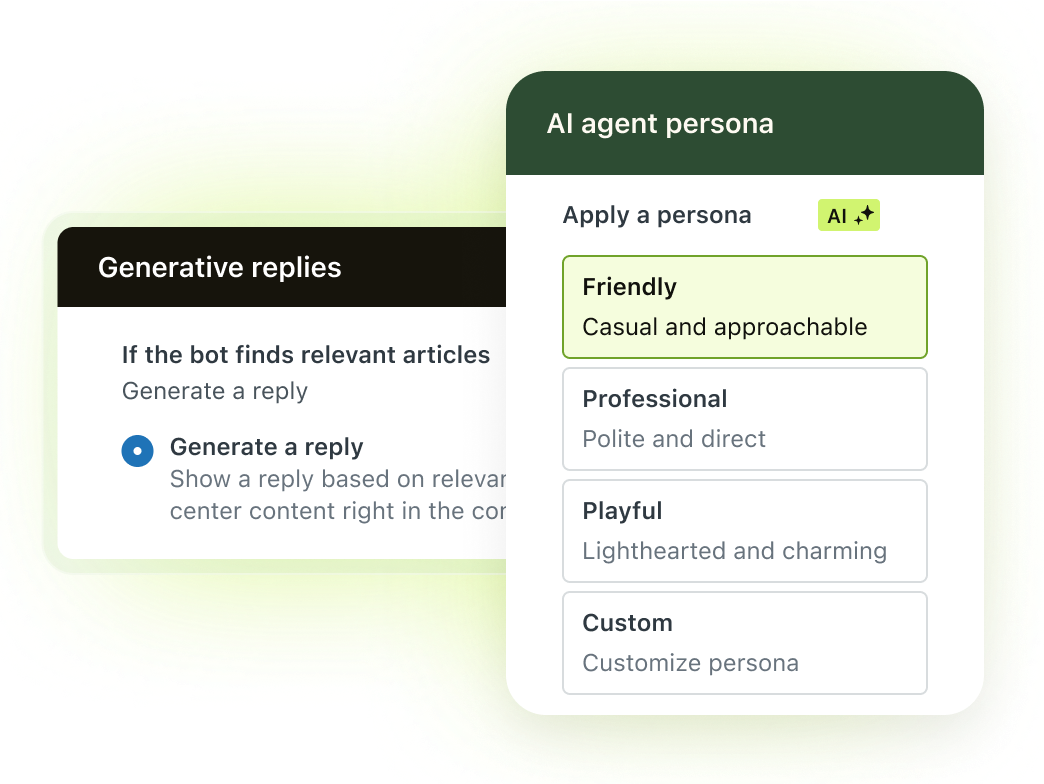
Key Zendesk features:
- Knowledge base integration - Zendesk AI agents connect with knowledge bases to generate on-brand responses to FAQs.
- Custom conversation flows enable the design of smarter paths to resolution for more complex issues.
- Seamless integration with backend systems - AI agents can authenticate customers and provide contextual responses.
- Agent Copilot - an AI-powered assistant for human agents, offering real-time suggestions for responses, knowledge base articles, and next best actions.
- QA integration - connects AI agents with QA to identify issues and boost their performance with actionable insights.
Pricing:
The pricing for the Suite Team plan that includes AI agents starts at $55 per agent per month.
3. Intercom
Intercom offers a customer service suite that combines an AI agent custom-built for customer support operations, Fin.ai, with a Helpdesk to increase team efficiency and improve services. Fin AI Agent handles customer queries, while human agents focus on priority issues. Additionally, Intercom supports customer service agents in investigating and resolving cases more efficiently with AI-powered tools.
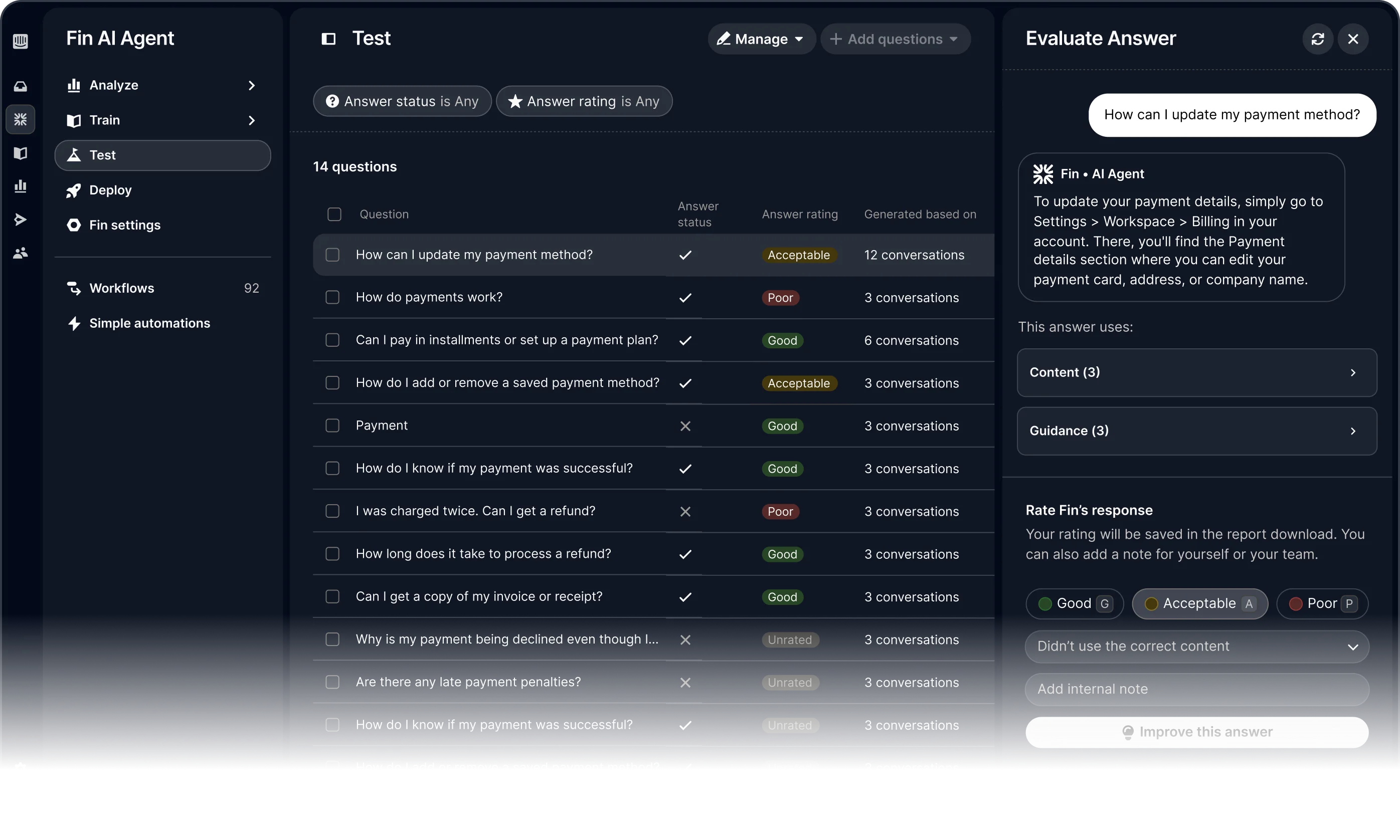
Key Intercom features:
- Fin AI Engine enables a Fin AI agent to refine queries, optimize responses, and validate the quality of its answers.
- Multi-source generative answers - Fin can provide relevant answers by accessing various knowledge sources, including help center articles, internal support content, PDFs, and conversation snippets.
- Fin Tasks - Fin can handle complex requests by following instructions to gather details, make decisions, and take action.
- Helpdesk - provides actionable insights and streamlines workflows to increase support agents' productivity.
- Copilot for agents - provides AI assistance to human agents in the inbox, summarizing conversations, personalizing replies, and automating simple tasks.
Pricing:
Intercom's pricing starts at $29 per user per month for individuals, startups, and small businesses. For those who already have a CRM solution or Helpdesk, Intercom provides an option to buy Fin.ai separately for $0.99 per resolution.
4. Salesforce
Salesforce Service Cloud enables collaboration between humans and AI agents across channels and industries. Salesforce's Agenforce handles low-touch interactions and helps customer service teams provide seamless experiences from first contact to final resolution. While humans focus on high-touch interactions, AI agents answer typical customer questions, manage orders, and troubleshoot issues.
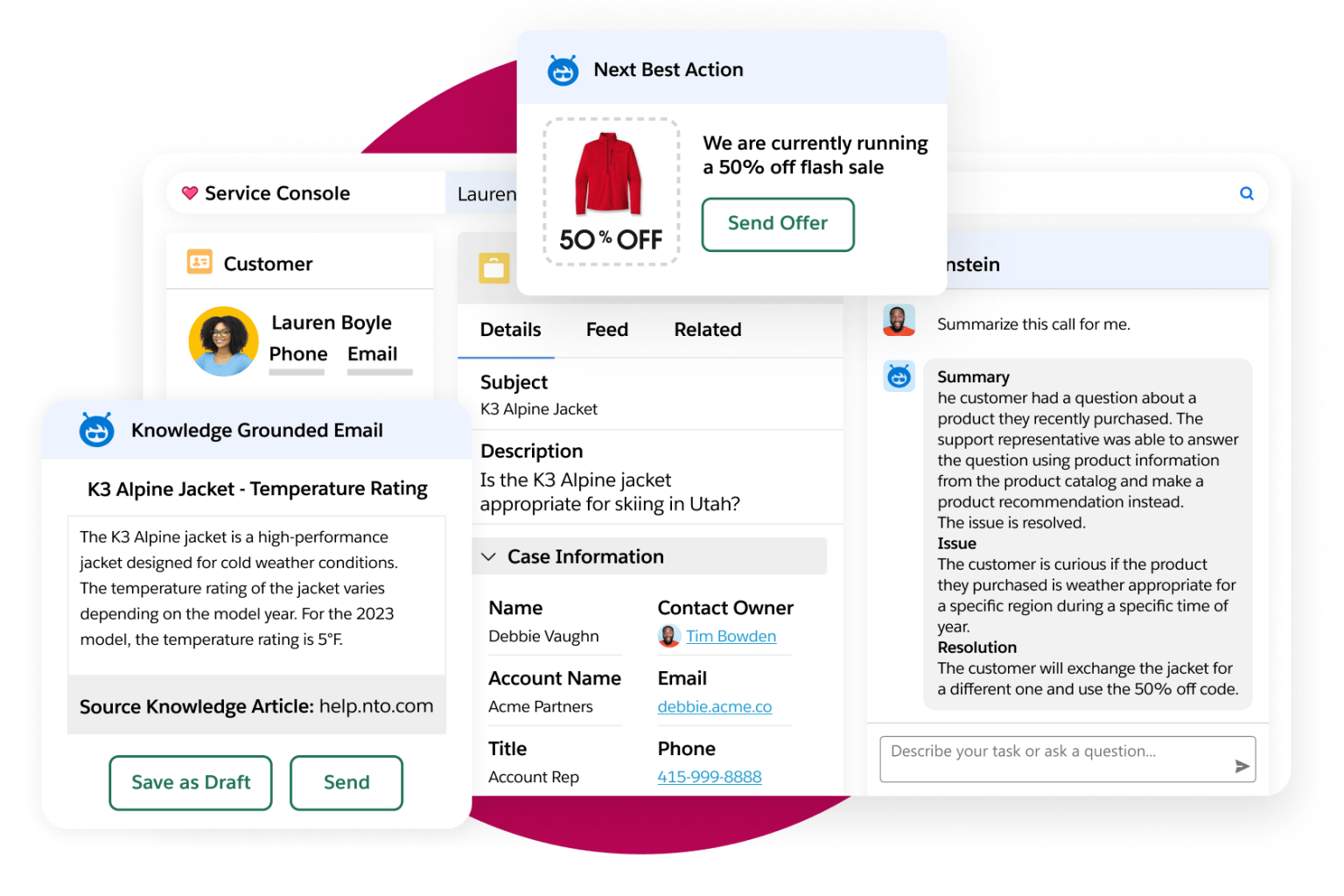
Key features of Agentforce for Service:
- Customer Service AI - predictive, generative, and conversational AI solutions built into workflows help increase customer satisfaction and boost service team productivity.
- Service Replies - AI-generated replies on SMS, WhatsApp SMS, and more.
- Service Assistant - streamlines customer support, enhances agent productivity, and ensures compliance with company policy.
- Conversation Summaries - offers AI-generated summaries for interaction, work, and order.
- Search Answers - generates answers from the trusted knowledge base and displays them directly in the service console or search page.
Pricing:
Pricing for Agentforce 1 Service, which includes a CRM platform for customer service, starts at $550 per user per month.
See also: Salesforce Alternatives & Competitors and Salesforce Marketing Cloud Alternatives & Competitors
5. Freshworks
Freshworks integrates Freddy AI into its Freshdesk platform to enhance customer service efficiency, automate responses, and provide data-driven insights. Freddy AI combines AI Agent and AI Copilot to instantly resolve queries across channels and provide teams with context and knowledge.
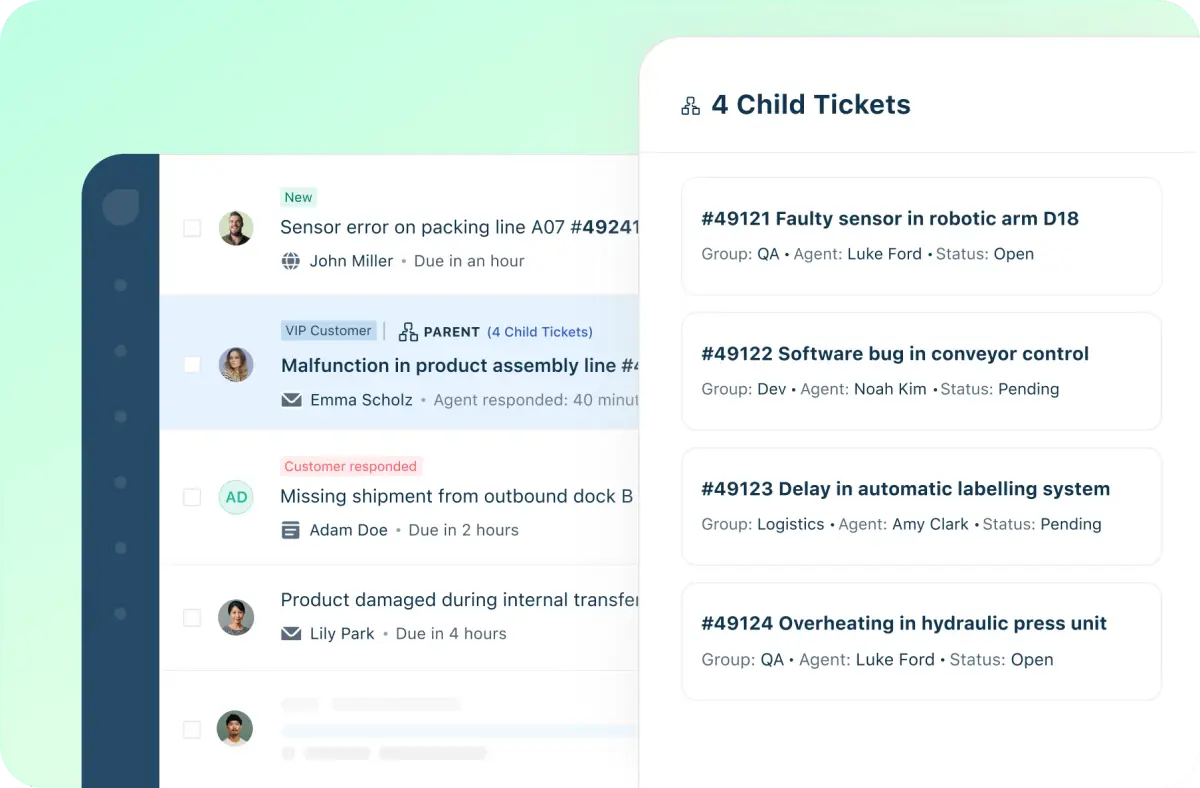
Key Freshdesk features:
- AI Agent Studio - enables users to deploy AI agents with pre-built skills for external systems such as Shopify and Stripe.
- Email AI agent - an AI agent that can read incoming email tickets, understand requests, and respond with the right solution.
- Conversation AI agents - update records, process refunds, and surface details to improve customer service team productivity.
- Case escalation - An AI agent can transfer conversations to human customer service agents with full context for a smooth hands-off process.
- Multichannel support - AI agents are built to handle conversations across different channels, including email, social media, chat, and WhatsApp.
Pricing:
The pricing for Freshdesk with Freddy AI starts at $78 per agent per month for the Pro + Copilot bundle. Alternatively, customers can purchase Freddy AI as an add-on to other plans, starting at $29 per agent per month.
6. HubSpot
HubSpot offers an AI-powered customer agent called Breeze as part of its Service Hub. Breeze can find relevant content, instantly answer pricing questions, and resolve customer issues accurately. It provides 24/7 support, resolving common problems, assisting with simple actions, and escalating to human agents when needed.
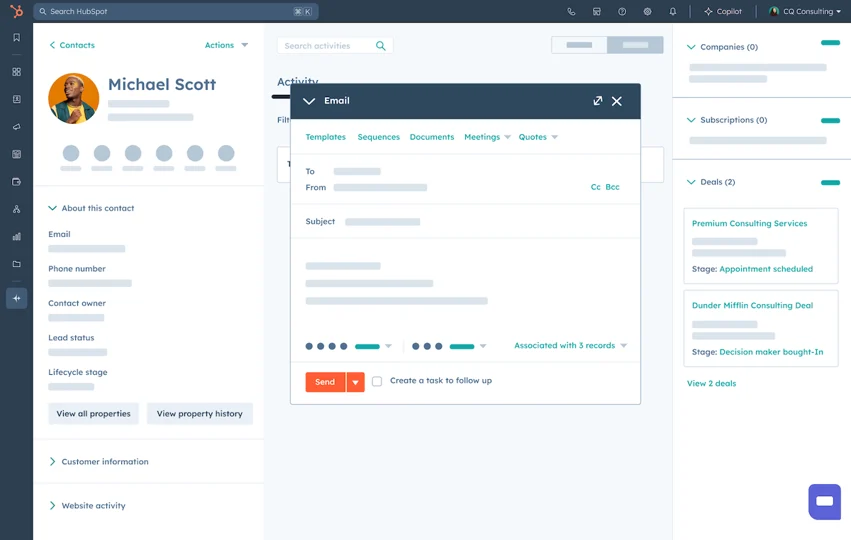
Key Breeze features:
- Instant, 24/7 support - customer support AI agent responds instantly to customer queries with accurate answers to boost client satisfaction.
- Trusted answers - Breeze provides accurate answers by using only approved content.
- Automatic handoff - Breeze automatically transfers cases to a rep when human support is needed.
- Multichannel support - Breeze works across multiple channels, including email, voice, social media, and chat.
- Performance tracking: An AI agent tracks resolution rates, handoffs, and customer sentiment to continuously improve customer satisfaction.
Pricing:
Breeze customer agent is priced based on the number of AI credits, with plans starting at $45 per month for a Small plan with 5000 credits. However, Breeze is only accessible for businesses already invested in the HubSpot platform, particularly those who use the Service Hub Professional and Enterprise. The pricing for Service Hub starts at $90 per user per month.
See also: Top 10 HubSpot Alternatives & Competitors
7. Sendbird
Sendbird is an AI agent platform for enterprises that aims to humanize customer experiences with omnichannel AI. Its AI agent is designed to elevate customer experience by personalizing every interaction and delivering fast assistance. With an AI agent for customer service, businesses can automate routine inquiries, reduce support costs, and increase resolution rates.
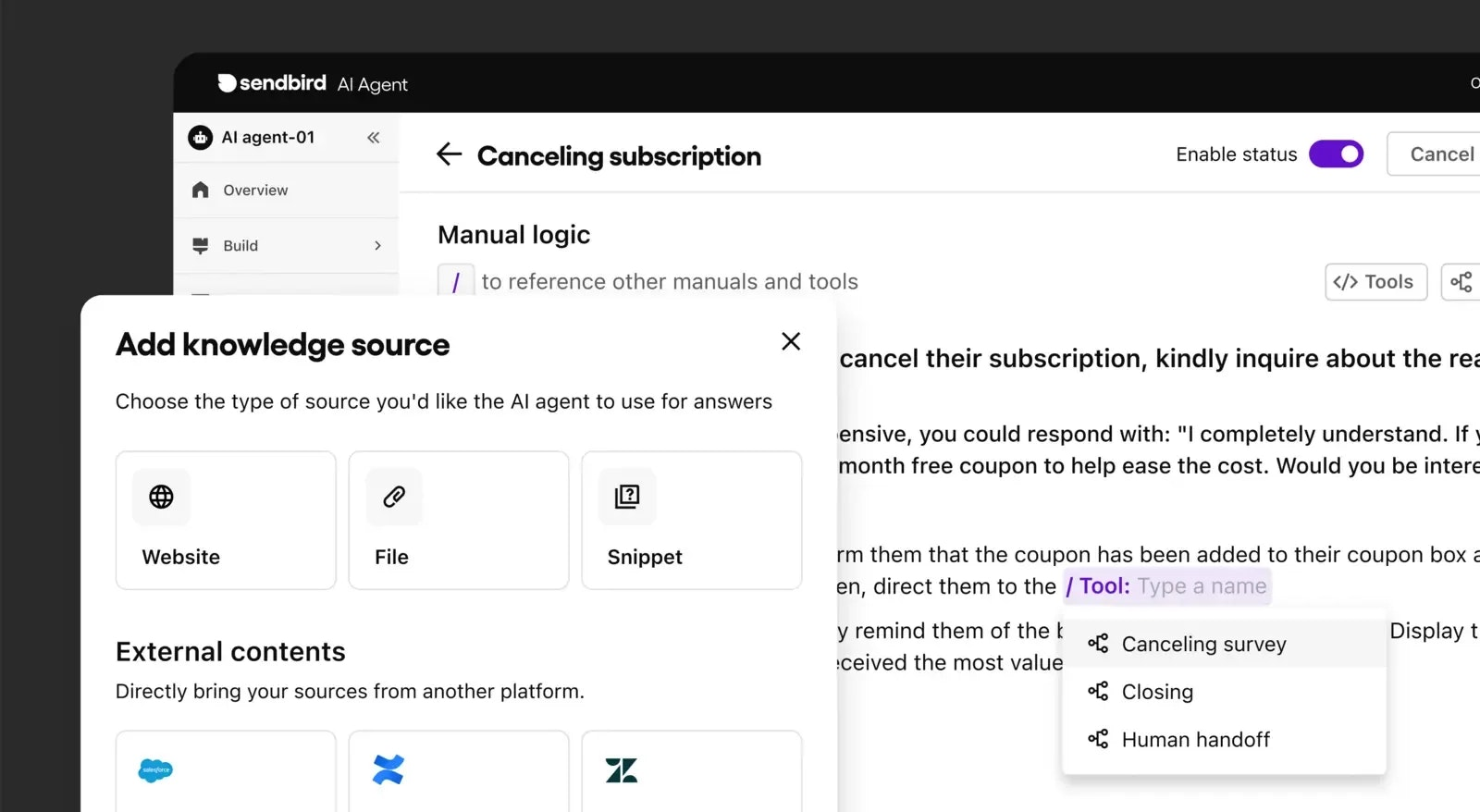
Key features of Sendbird:
- Omnipresent AI - Sendbird's AI agent interacts with customers across multiple channels and remembers every interaction, so customers don't have to repeat themselves.
- Proactive AI chat - predicts intent, detects friction, and resolves issues before they escalate.
- AI agent builder enables building highly personalized AI agents for customer service that reflect the brand's values, voice, and style.
- AI recommendations - provides data-driven suggestions to optimize AI agents for improved performance.
- Integration with customer support software - Sendbird seamlessly connects with customer support platforms such as Zendesk and Freshchat and supports third-party knowledge base integration.
Pricing:
Sendbird offers consumption-based pricing tailored to business size and conversation volume. Pricing information is only available upon request.
The Future of AI in Customer Service
As artificial intelligence continues to evolve, AI in customer service will enable even more efficient, scalable, and personalized services. Role-based AI agents, multi-agent systems, and increasingly advanced automation will shape the future of AI technology.
In this section, we will explore how each of these concepts will define the next generation of AI-powered customer support:
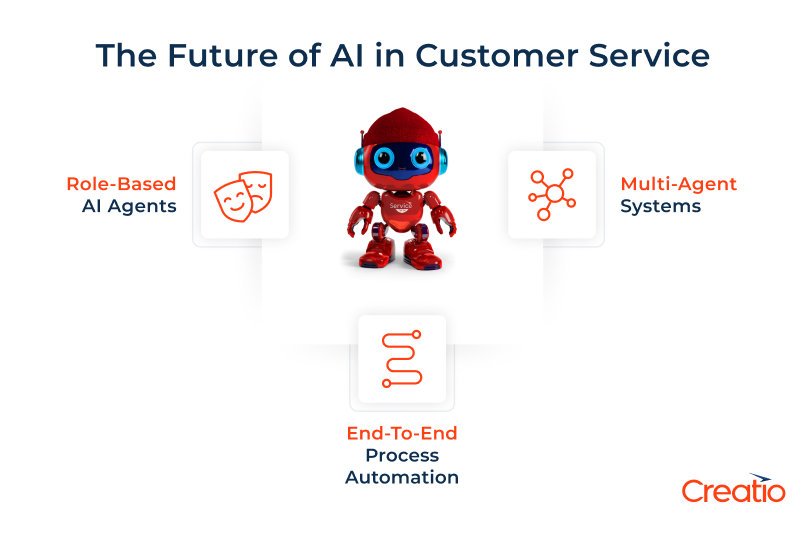
1. Role-based AI agents
AI vendors increasingly adopt role-based AI agents, designed to handle specific tasks or functions, replacing more generic systems. Rather than relying on a one-size-fits-all AI, businesses introduce specialized agents that focus on one process, such as billing, technical support, or account management. Each AI agent has in-depth knowledge and expertise to tackle these tasks, delivering more accurate and high-quality customer service.
2. Multi-agent systems
According to Creatio’s Enterprise Automation Trends Report, in 2026, organizations will move beyond isolated AI agents toward coordinated multi-agent systems built around specific industry domains.
The future of AI in customer service will focus on a sophisticated orchestration of multiple, role-based AI agents, rather than a single, monolithic AI. In this multi-agent system, the manager agent breaks down complex tasks into more manageable subtasks and assigns them to specialized sub-agents. AI agents can also collaborate and share information, enhancing their problem-solving capabilities.
For example, when a customer wants to remove one product from their order, the system will trigger an order management agent to check if it is still possible and adjust it accordingly. Once this AI agent completes its task, a billing agent will change the receipt and initiate a partial refund. Another agent will notify the customer once the task is complete, provide a link to track their modified order, and give an estimate for when they can expect the partial refund.
3. End-to-end process automation
By combining role-based AI agents into a multilayered system, businesses can achieve higher levels of automation, with AI agents handling routine tasks as well as complex, end-to-end processes.
According to Zowie, AI-powered virtual assistants automate over 70% of all customer queries, delivering relevant responses and personalized service. In the future, AI agents will manage the entire customer interaction lifecycle, from initial inquiry to post-service follow-up, with minimal human intervention in many cases. Servion Global Solutions predicts that by 2028, up to 95% of all customer interactions will be powered by AI

In 2026, enterprise automation will finally graduate from isolated experiments to fully integrated AI teammates that run end-to-end workflows across the organization. The companies that thrive will be the ones that treat agents not as tools, but as a new class of digital workers capable of unlocking intelligent efficiency at scale.
Servion Global Solutions predicts that by 2028, up to 95% of all customer interactions will be powered by AI, while Gartner estimates that AI customer service agents will help reduce the average case handling time by 35% by 2030.
Summary
AI agents are reshaping customer service by shifting organizations from reactive, human-only support models to intelligent, scalable service operations. Powered by machine learning and natural language processing, customer service AI agents understand requests, execute workflows, handle routine cases, and support faster case resolution with data-driven insights. Leading vendors, such as Creatio, offer organizations powerful agents that natively integrate with the CRM and case management system, enabling them to benefit from these capabilities without added complexity. Organizations that implement these intelligent tools see significant improvements in productivity, case resolution rates, and customer satisfaction, proving that AI agents are the future of effective customer support.
























































